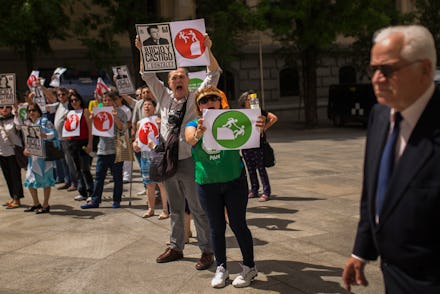How Spain's Economic Crisis is Crushing Hardworking Young People Like Me

Two and a half years ago, streets and plazas across Spain were packed with protesters. They were part of what became known as the 15-M or Indignados movement (named after May 15, 2011, when the protests began), which simultaneously channeled the collective frustrations and fueled the hopes of as many as 6.5 million Spaniards who took part in the demonstrations during those months. Today, frustrations among young people in Spain are higher than ever. Hope for political and economic reform, on the contrary are at an all-time low.
In the wake of Spain's greatest economic crisis in decades, the heterogeneous Indignados movement powerfully voiced the woes and dreams shared by young people across Spain. The list of concerns was clear: Unemployment rates were soaring at a jaw-dropping pace (jumping from around 8% in 2007 to nearly 23% by the end of 2011), austerity measures in the form of welfare cuts and tax increases started to be part of daily life, and public bailouts of distressed sectors became seen as inevitable (as happened in 2012 with the €41 billion rescue of the banking system).
The elephant in the room in most conversations was a potential Greece-like bailout. Economic topics once ignored by the population at large, like the spread between Spanish bonds and German ones — a measure of the perceived risk of the nation's situation — were now compulsively followed daily and highly publicized in the media, along with the likelihood of the euro zone's breakup.
So, what has come of all of this? How are we, young Spaniards, faring these days?
Gloom, apathy, and resignation could well describe the atmosphere. The statistics speak for themselves: Youth unemployment reached a new height of 56% in August 2013. In some regions, like rural Jaén, that figure is almost 75%. The lack of jobs at home has caused overqualified young Spaniards to flee the country in search of better opportunities elsewhere. Some of us are leaving to pursue an education. After receiving a bachelor's degree at Universidad Carlos III in Madrid,where I was born and raised, I have gone to Amsterdam to study development economics as the opportunities are limited in my home country.
Meanwhile, for those back home, unemployment remains high even in the face of a shrinking workforce. A new term has emerged for those who leave their job search and their education altogether: "ninis" (short for "Ni estudian ni trabajan," or "They neither study nor work"). Even for those who do work, the picture is not pretty. Many face salary cuts and reduced work hours. Those new to the job market receive temporary rather than indefinite contracts, and everyone has seen their unemployment benefits reduced after a recent round of reforms by Prime Minister Mariano Rajoy's conservative government.
It's worth noting that as bad as the Spanish economy appears today, the country's dire situation is not the result of mismanaged public finances, like in Greece. In fact, Spain's current deficit and debt levels are more a consequence of the crisis than a cause of it. In the pre-crisis years, Spain was considered a model of proper budgeting, with low debt-to-GDP ratios (36% in 2007, compared to more than 90% today). Spain's financial crisis, similar to Ireland's, is a case of excessive private debt incurred by households and firms, which eventually resulted in a huge real-estate bubble. Couple that with the international financial crisis of 2008, and the result is long lines at unemployment offices.
Line outside of an unemployment office in Madrid | Via AP
Spain's economic woes are not, however, its only ones. The country has been plagued by massive political problems including a series of corruption scandals, even involving the Royal Family, and politicians' broken promises (for instance, the Socialist Party won the 2008 general elections running ads that promised full employment within their term). Overall, young Spaniards have become increasingly disenchanted with the political process and with their elected representatives.
Yet, for all these worries, enthusiastic millennials still believed in a better future. They organized themselves and agreed on lists of demands, sometimes naïve, and sometimes targeted. At the core of the 15-M movement was a demand for a better, more inclusive country. For instance, one of the movement's central proposals is to implement a system of proportional representation, which would pose greater opportunities for a variety of political parties to make themselves heard. The Indignados also insisted on establishing better mechanisms to hold political leaders accountable for their actions, and on a better system of checks and balances between different parts of the government to fight corruption.
Barcelona youth protest in 2011 | Image Credit: Almost Fearless blog
In the absence of government support, Spain's young people have been left to their own devices. The initial fervor of the 15-M movement has died down. All isn't lost: Spain finally exited from recession after more than two years. But the unemployment rate for young people is as high as ever, and the attitude among young people is summarized by the name of one of the Indignados' largest organizing bodies: "Juventud sin futuro." Youth without hope.